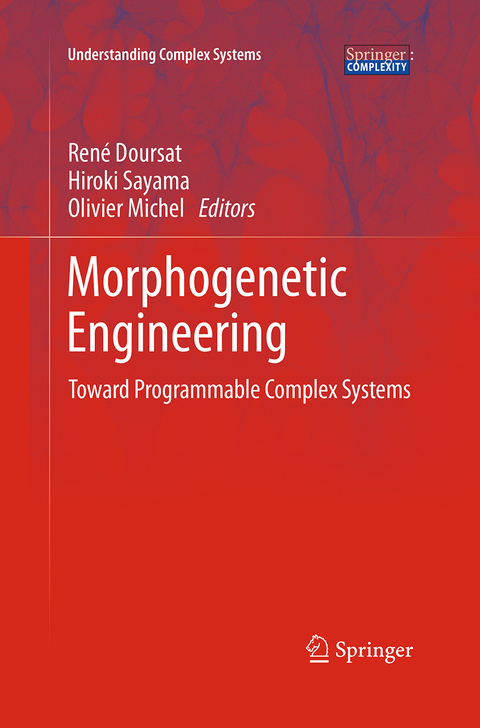
Morphogenetic Engineering
Springer Berlin (Verlag)
978-3-662-50564-9 (ISBN)
Generally, spontaneous pattern formation phenomena are random and repetitive, whereas elaborate devices are the deterministic product of human design.
Yet, biological organisms and collective insect constructions are exceptional examples of complex systems that are both self-organized and architectural.
This book is the first initiative of its kind toward establishing a new field of research, Morphogenetic Engineering, to explore the modeling and implementation of "self-architecturing" systems. Particular emphasis is placed on the programmability and computational abilities of self-organization, properties that are often underappreciated in complex systems science-while, conversely, the benefits of self-organization are often underappreciated in engineering methodologies.
Altogether, the aim of this work is to provide a framework for and examples of a larger class of "self-architecturing" systems, while addressing fundamental questions such as
> How do biological organisms carry out morphogenetic tasks so reliably?
> Can we extrapolate their self-formation capabilities to engineered systems?
> Can physical systems be endowed with information (or informational systems be embedded in physics) so as to create autonomous morphologies and functions?
> What are the core principles and best practices for the design and engineering of such morphogenetic systems?
The intended audience consists of researchers and graduate students who are working on, starting to work on, or interested in programmable self-organizing systems in a wide range of scientific fields, including computer science, robotics, bioengineering, control engineering, physics, theoretical biology, mathematics, and many others.
Morphogenetic Engineering: Reconciling Self-Organization and Architecture.- SWARMORPH: Morphogenesis with Self-Assembling Robots.- Morphogenetic Robotics: A New Paradigm for Designing Self-Organizing, Self-Reconfigurable and Self-Adaptive Robots.- Distributed Autonomous Morphogenesis in a Self-Assembling Robotic System.- Collective Construction with Robot Swarms.- Issues in Self-Repairing Robotic Self-Assembly.- Programming Self-Assembling Systems via Physically Encoded Information.- Swarm-Based Morphogenetic Artificial Life.- Chemotaxis-Inspired Cellular Primitives for Self-Organizing Shape Formation.- Emergent Swarm Morphology Control of Wireless Networked Mobile Robots.- Embryomorphic Engineering: Emergent Innovation Through Evolutionary Development.- Functional Blueprints: An Approach to Modularity in Grown Systems.- Mechanisms for Complex Systems Engineering Through Artificial Development.- A Synthesis of the Cell2Organ Developmental Model.- A Computational Framework for Multilevel Morphologies.- Interaction-Based Modeling of Morphogenesis in MGS.- Behavior-Finding: Morphogenetic Designs Shaped by Function.- Swarm-Based Computational Development.- Programmable and Self-Organized Processes in Plant Morphogenesis: The Architectural Development of Ryegrass.
| Erscheinungsdatum | 09.07.2016 |
|---|---|
| Reihe/Serie | Understanding Complex Systems |
| Zusatzinfo | IX, 517 p. |
| Verlagsort | Berlin |
| Sprache | englisch |
| Maße | 155 x 235 mm |
| Gewicht | 1950 g |
| Themenwelt | Informatik ► Theorie / Studium ► Künstliche Intelligenz / Robotik |
| Naturwissenschaften ► Physik / Astronomie ► Angewandte Physik | |
| Technik | |
| Schlagworte | adaptive self-organization • Autonomous morphologies and functions • morphogenetic engineering • programmable complex systems • Self-architecting and self-architecturing systems • systems biology |
| ISBN-10 | 3-662-50564-9 / 3662505649 |
| ISBN-13 | 978-3-662-50564-9 / 9783662505649 |
| Zustand | Neuware |
| Haben Sie eine Frage zum Produkt? |
aus dem Bereich


